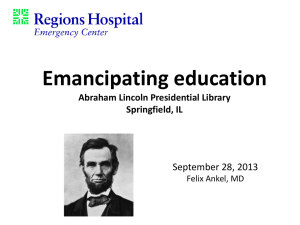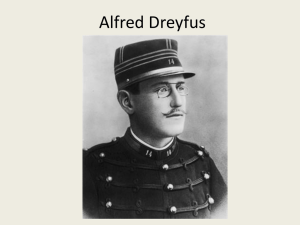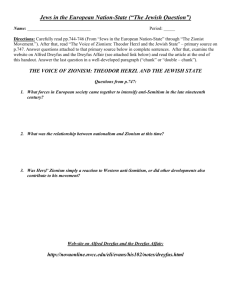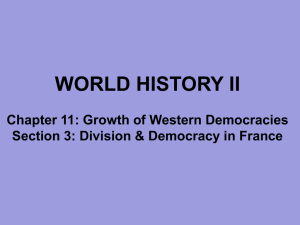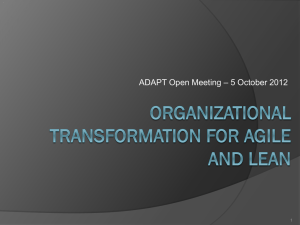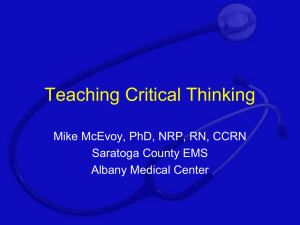2013 Dreyfus Foundation newsletter
advertisement
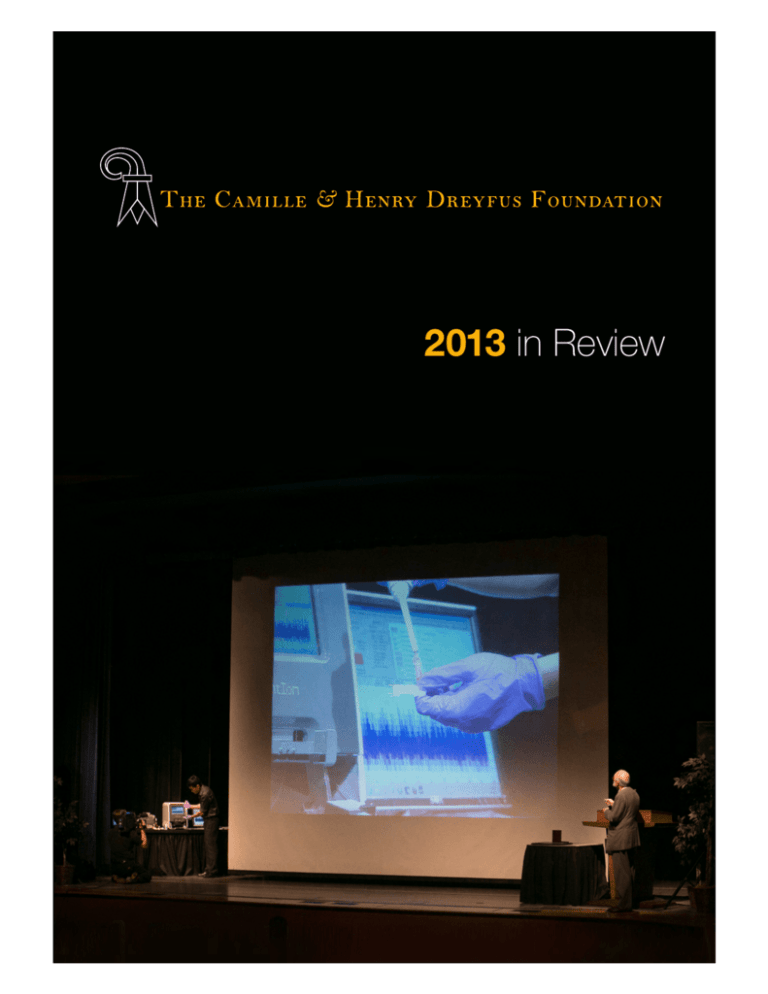
2013 in Review Letter from the President, Henry C. Walter L ast September we honored R. Graham Basel. The first speaker chosen was Cooks of Purdue University as the third George Whitesides of Harvard University. recipient of the biennial Dreyfus Prize in the Details regarding his lectureship are Chemical Sciences, conferred in chemical described in this report. instrumentation in 2013. He was cited for his groundbreaking innovations in mass The Foundation’s roster of Advisors will spectrometry that have profoundly enriched rotate in 2014, as the term of John Tully of analytical chemistry. It was especially gratifying Yale University will conclude in April. The to see such a large and enthusiastic turnout Board thanks John for eight years of his from the Purdue community to honor contributions, carried out with the highest Graham’s accomplishments. His award standards, broad knowledge, and insight. address, “Measuring Molecules: Grocery We are pleased that Louis Brus of Columbia Stores, Doctors’ Offices, Crime Scenes, University has agreed to serve as an Advisor, Operating Rooms, and Factory Floors,” joining David Hansen of Claremont McKenna, which is now streaming on the Dreyfus Pitzer, and Scripps Colleges, Francois Morel Web site, included a live demonstration of Princeton University, and JoAnne Stubbe (pictured on the cover of this report) of the of Massachusetts Institute of Technology. portable mass spectrometer that he has developed. The applications of this innovation As 2013 drew to a close, we received the cover a wide range of areas with potentially sad news that Harry Wasserman passed major impacts, admirably reflecting the away. Harry was associated with the Dreyfus charter. Foundation for more than 40 years, serving as a Board member, Advisor, and always a Graham Cooks will also be among the friend. He was instrumental in the creation of speakers who will present their research the Teacher-Scholar awards, which became at a Presidential Symposium on Chemical the Foundation’s flagship program. All of us Instrumentation at the national meeting of at Dreyfus will miss Harry, though his legacy the American Chemical Society in Dallas and influence will continue to be felt here at on March 18, 2014. The distinguished the Foundation. chemists scheduled to speak represent major contributors to the field: David Finally, in my letter for the 2012 Year in Chandler, Michael Fayer, Wayne Hendrickson, Review I wrote about Camille and Henry Wilson Ho, Ann McDermott, W. E. Moerner, Dreyfus, and their research. Last year the and Lloyd Smith. The Dreyfus Foundation Foundation produced a brief video that is pleased to support this symposium and elaborates on this theme and also describes we hope you will be able to join us. the origin and history of the Dreyfus Foundation. It includes archival footage and Both of the Dreyfus brothers received their photographs, as well as commentary from Ph.D. degrees in chemistry from the several members of the Board. This video University of Basel at the start of the last is found on the Foundation Web site. I hope century. The Foundation has commemorated you will enjoy it, and wish you all the best for this heritage by establishing a Lectureship at a fruitful 2014. Graham Cooks Awarded 2013 Dreyfus Prize R . Graham Cooks, the Henry Bohn Hass Distinguished Professor of Chemistry at Purdue University, is the recipient of the 2013 Dreyfus Prize in the Chemical Sciences, which was conferred in chemical instrumentation. The international prize, awarded biennially, consists of $250,000, a citation, and a medal. The award ceremony was held at Purdue University on September 24, 2013, and featured a lecture by Professor Cooks. Graham Cooks is recognized internationally as an innovative giant in the field of mass spectrometry who has enriched analytical chemistry in unparalleled ways.Virtually every pharmaceutical and biotechnology company relies on mass spectrometry at a level that has become possible through his innovations. Mass spectrometry, the science of accurately determining the masses of molecules in a sample, yields the elemental composition of each constituent molecule. Cooks advanced this analytical capability with the introduction of tandem mass spectrometry in which selected ions generated from complex mixtures are further fragmented and the masses of the fragment ions determined. By putting together these puzzle pieces, a picture emerges of the molecular structure of the parent ion. Cooks has also made groundbreaking advances in ambient desorption/ionization in which ions from a sample at room temperature in air are introduced into the mass spectrometer for analysis. This removes many of the difficulties associated with sample preparation and volatilization in previous complex mass spectrometric techniques and broadens the application space of the technique. In a remarkable accomplishment, Cooks and colleagues have recently created miniature mass spectrometers, enabling the remote deployment of these analytical instruments including under battery power. Mass spectrometers, once roughly as large as an automobile, can now be reduced to shoebox size, allowing their widespread use in clinics, homeland security, the military, and food safety. One noteworthy application of this instrument is a collaboration at Brigham and Women’s Hospital in Cambridge, Massachusetts, in which a real-time, rapid determination of the edges of cancerous tumors is made during brain surgery. Cooks noted, “We are trying to take powerful and sophisticated instruments out of the lab and into the real environment where, for example, they could monitor fresh produce all along the supply chain, from production to the consumers. This technology has the capability of testing for bacteria in only a matter of minutes as opposed to hours or even days for standard laboratory tests.” Cooks described the Dreyfus Prize as a major career highlight. “I am particularly pleased that the Dreyfus Foundation chose chemical instrumentation as the topic of the prize,” Cooks stated, “because it is an emphatic recognition of the importance of instrumentation in the chemical sciences.” Richard N. Zare, the Marguerite Blake Wilbur Professor in Natural Science at Stanford University and a Board member of the Dreyfus Foundation, remarked, “Mass spectrometry has had an extraordinary impact on modern science, and Graham Cooks has changed the field in many important ways. He has developed critical new experimental instruments and methods and applied them to solve significant problems.” Jim Anderson and Greg Engel R. Graham Cooks and Henry Walter, President of the Dreyfus Foundation George Whitesides Inaugural Dreyfus Lecturer at University of Basel T he first annual Camille and Henry Dreyfus Lectureship at the University of Basel in Switzerland was held on October 2-5, 2013. George Whitesides of Harvard University, the inaugural lecturer, presented three seminars and held a scientific writing workshop during his visit to the campus. The lectures were widely attended by a diverse audience that included undergraduate and graduate students, professors from many different departments in the sciences, high school teachers, and journalists. The Camille and Henry Dreyfus Lectureship will annually support bringing a leading U.S. chemist to Basel to deliver a series of talks and meet with students and faculty. George Whitesides at the University of Basel Postdoctoral Program in Environmental Chemistry T he Postdoctoral Program in Environmental Chemistry continues to attract a great variety and number of exciting proposals. The topics of this year’s selections for awards include research on: use of polymer-based photonic crystals for cooling; innovative water purification chemistry; dynamics of dye-sensitized charge injection and multiexciton generation in solar cells; the interactions of microbes with clouds and climate; conductive metal-oxide frameworks for photovoltaics; isoprene-based aerosol chemistry; and Bi-based catalysis for CO2 reduction. Of the 116 postdoctoral fellows who have completed the Dreyfus program, approximately 90% have gone on to positions in the environmental field. Teacher-Scholar Conference to be Held in October 2014 T he third conference for Camille and Henry Dreyfus Teacher-Scholars will be held at the New York Academy of Sciences on October 24, 2014. Approximately 40 of the most recent Teacher-Scholars will present posters of their research, bracketed by talks from four senior Teacher-Scholars. This year’s speakers will be: Emily Carter, Founding Director, Andlinger Center for Energy and the Environment, Princeton University; Leroy Hood, President and co-founder, Institute for Systems Biology; Stephen Lippard, Arthur Amos Noyes Professor, Massachusetts Institute of Technology; and David Oxtoby, President, Pomona College. Sanjay Sarma, the Director of Digital Learning at Massachusetts Institute of Technology, will also make a presentation on the latest developments in digital learning and the impact of MOOCs in higher education. Poster session at 2012 Teacher-Scholar conference Jean Dreyfus Boissevain Lectureships T he Jean Dreyfus Boissevain Lectureship Program brings leading researchers to primarily undergraduate institutions to give both popular and technical lectures in the chemical sciences, and to meet with faculty and students. The award also supports the summer research of two undergraduate students. The following Lectureships were held in 2013: College–Lecturer: Robert Grubbs, California Institute of Technology: “Green Chemistry: Examples from Catalysis” and “Design and Applications of Selective Olefin Metathesis Catalysts” nC olgate University–Lecturer: Geert-Jan Boons, University of Georgia: “Cancer Vaccines and Carbohydrates” and “A Fully Synthetic Multicomponent Vaccine for Cancer” nE astern Michigan University–Lecturer: John C. Warner, Warner Babcock Institute for Green Chemistry: “Green Chemistry: The Missing Element” and “Entropic Control in Materials Design” n University of St. Thomas–Lecturer: Jay Keasling, University of California, Berkeley: “Life 2.0: Engineering Biology for Sustainable Development” and “Advanced Fuels from Advanced Plants” nB ard University–Lecturer: Daniel Nocera, Harvard University: “The Global Energy Challenge,” “Chemistry of Solar Fuels,” and “The Artificial Leaf ” nV illanova Robert Grubbs with Bard College students Dreyfus-Sponsored ACS Awards S ince 1998, the Dreyfus Foundation has sponsored two annual awards that are administered by the American Chemical Society: for Encouraging Women into Careers in the Chemical Sciences and for Encouraging Disadvantaged Students into Careers in the Chemical Sciences. In 2013, these awards were made to Heather Allen, The Ohio State University, and George H. Fisher, Barry University, respectively. Each award consists of $5,000 to the awardee and a grant of $10,000 to an eligible non-profit institution, designated by the recipient, to strengthen its activities in meeting the objectives of the award. Heather Allen and George H. Fisher Senior Scientist Mentor Program T he Dreyfus Foundation’s Senior Scientist Mentor Program supports faculty who maintain active research programs in the chemical sciences. The purpose of the award is to encourage emeritus faculty members to take on undergraduates to do research under their guidance. The emeritus scientists receive John D. Roberts grants of $10,000 annually for two years ($20,000 total) to be used primarily for undergraduate stipends. More than 130 awards have been made since the program’s inception in 2000. Beneficiaries of this program include the undergraduates, who are able to learn under the direct guidance of a mentor who has a lifetime of knowledge and experience; the Senior Scientist who, as an emeritus faculty typically no longer works with graduate students or teaches courses, stays active and integrated within the university; and the institution, which is able to offer broader options for undergraduates who want to conduct research. Among the many esteemed chemists who have been supported by this award are: John D. Roberts of California Institute of Technology, James Dye of Michigan State University, Theodore Cohen of University of Pittsburgh, Esther Conwell of University of Rochester, Norman Craig of Oberlin College, and Joseph Sherma of Lafayette College. Award Programs and 2014 Deadlines The Dreyfus Prize in the Chemical Sciences, The Postdoctoral Program in Environmental awarded biennially, consists of a monetary award of Chemistry is intended to further the development $250,000, a medal, and a citation. The prize, which is of scientific leadership in the field of environmental open to international nominations, is awarded to an chemistry. The award provides a principal investigator individual in a selected area of chemistry to recognize with $120,000 over two years to appoint a postdoctoral exceptional and original research that has advanced the fellow in environmental chemistry. field in a major way. Announcement of topic: Fall 2014 Deadline: August 11, 2014 Deadline: early 2015 The Special Grant Program in the Chemical The Camille Dreyfus Teacher-Scholar Awards Sciences provides funding for innovative projects Program supports the research and teaching careers in any area consistent with the Foundation’s broad of talented young faculty in the chemical sciences at objective to advance the chemical sciences. Examples Ph.D.-granting institutions. Based on institutional of areas of interest include (but are not limited to): nominations, the program provides discretionary funding increasing public awareness, understanding, and to faculty prior to their sixth year of appointment. appreciation of the chemical sciences; innovative Criteria for selection include an independent body of approaches to chemistry education at all levels (K-12, scholarship attained as independent researchers, and a undergraduate, and graduate); and efforts to make demonstrated commitment to education. The award chemistry careers more attractive. Research proposals provides an unrestricted research grant of $75,000. are not customarily considered. Deadline: February 10, 2014 Deadline: June 5, 2014 The Henry Dreyfus Teacher-Scholar Awards The Senior Scientist Mentor Program supports Program supports the research and teaching careers emeritus faculty who maintain active research programs of talented young faculty in the chemical sciences at with undergraduates in the chemical sciences. The primarily undergraduate institutions. Based on institutional award provides $20,000 over two years for undergraduate nominations, the program provides discretionary funding stipends and modest research support. to faculty who are within the fourth and twelfth years Deadline: September 8, 2014 of their independent academic careers. The award is based on accomplishment in scholarly research with The Jean Dreyfus Boissevain Lectureship undergraduates, as well as a compelling commitment to for Undergraduate Institutions provides an teaching. The award provides an unrestricted research $18,500 grant to bring a leading researcher to a primarily grant of $60,000. undergraduate institution to give a series of lectures in the Deadline: May 19, 2014 chemical sciences. The lecturer is expected to substantially interact with undergraduate students and faculty over the period of the visit. The program provides funds to host the speaker and to support summer research opportunities for two undergraduate students. Deadline: May 19, 2014 2013 Awards Dreyfus Prize in the Chemical Sciences R. Graham Cooks, Purdue University Camille Dreyfus Teacher-Scholar Awards Program Theodore A. Betley, Harvard University Michelle C. Chang, University of California, Berkeley William R. Dichtel, Cornell University Abigail G. Doyle, Princeton University Neil K. Garg, University of California, Los Angeles Thomas W. Hamann, Michigan State University Mandë Holford, Hunter College of the City University of New York Munira Khalil, University of Washington Stephen Maldonado, University of Michigan Thomas F. Miller, California Institute of Technology Baron Peters, University of California, Santa Barbara Charles M. Schroeder, University of Illinois at Urbana-Champaign Corey R. J. Stephenson, Boston University Henry Dreyfus Teacher-Scholar Awards Program Chiles Wade Downey, University of Richmond Danielle H. Dube, Bowdoin College Paul J. Fischer, Macalester College Amanda M. Grannas, Villanova University Catherine M. Oertel, Oberlin College Kathleen L. Purvis-Roberts, Claremont McKenna College David A.Vosburg, Harvey Mudd College Postdoctoral Program in Environmental Chemistry Mircea Dinca, Massachusetts Institute of Technology Ellen R. Fisher, Colorado State University Robert H. Grubbs, California Institute of Technology Elad Harel, Northwestern University Athanasios Nenes, Georgia Institute of Technology Poul B. Petersen, Cornell University Joel Rosenthal, University of Delaware Jason D. Surratt, The University of North Carolina at Chapel Hill Special Grant Program in the Chemical Sciences California Institute of Technology The Indianapolis Museum of Art Massachusetts Institute of Technology Michigan State University Moreno-Lyons Productions Museum of Science, Boston NYC Debate League New York University Oklahoma School of Science and Mathematics University of California, San Diego University of Cincinnati University of Georgia The University of Southern Mississippi The University of Texas at Austin University of Virginia Williams College Senior Scientist Mentor Program James R. Bamburg, Colorado State University John H. Enemark, University of Arizona Kenneth Hedberg, Oregon State University Joseph Lambert, Trinity University Allan Nishimura, Westmont College Claude H. Yoder, Franklin and Marshall College Jacques L. Zakin, The Ohio State University Jean Dreyfus Boissevain Lectureship for Undergraduate Institutions Allegheny College Carleton College Kenyon College St. Olaf College Trinity University Board of Directors Honorary Directors Henry C. Walter, President H. Marshall Schwarz Dorothy Dinsmoor, Vice President and Secretary Harry H. Wasserman H. Scott Walter, Treasurer and Chair, Finance and Audit Committee Advisors Marye Anne Fox, Chair, Scientific Affairs Committee John R. H. Blum Edward A. Reilly John I. Brauman Richard N. Zare Matthew V. Tirrell Staff Mark J. Cardillo, Executive Director Gerard Brandenstein, Associate Director Adam Lore, Operations Manager David E. Hansen Francois M. M. Morel JoAnne Stubbe John C. Tully Honorary Advisors Robert A. Alberty Dudley R. Herschbach John D. Roberts The mission of the Camille and Henry Dreyfus Foundation is to advance the science of chemistry, chemical engineering, and related sciences as a means of improving human relations and circumstances throughout the world. Established in 1946 by chemist, inventor, and businessman Camille Dreyfus as a memorial to his brother Henry, the Foundation became a memorial to both men when Camille Dreyfus died in 1956. Throughout its history the Foundation has sought to take the lead in identifying and addressing needs and opportunities in the chemical sciences. 555 Madison Avenue New York, New York 10022 T: (212) 753-1760 F: (212) 593-2256 www.dreyfus.org
